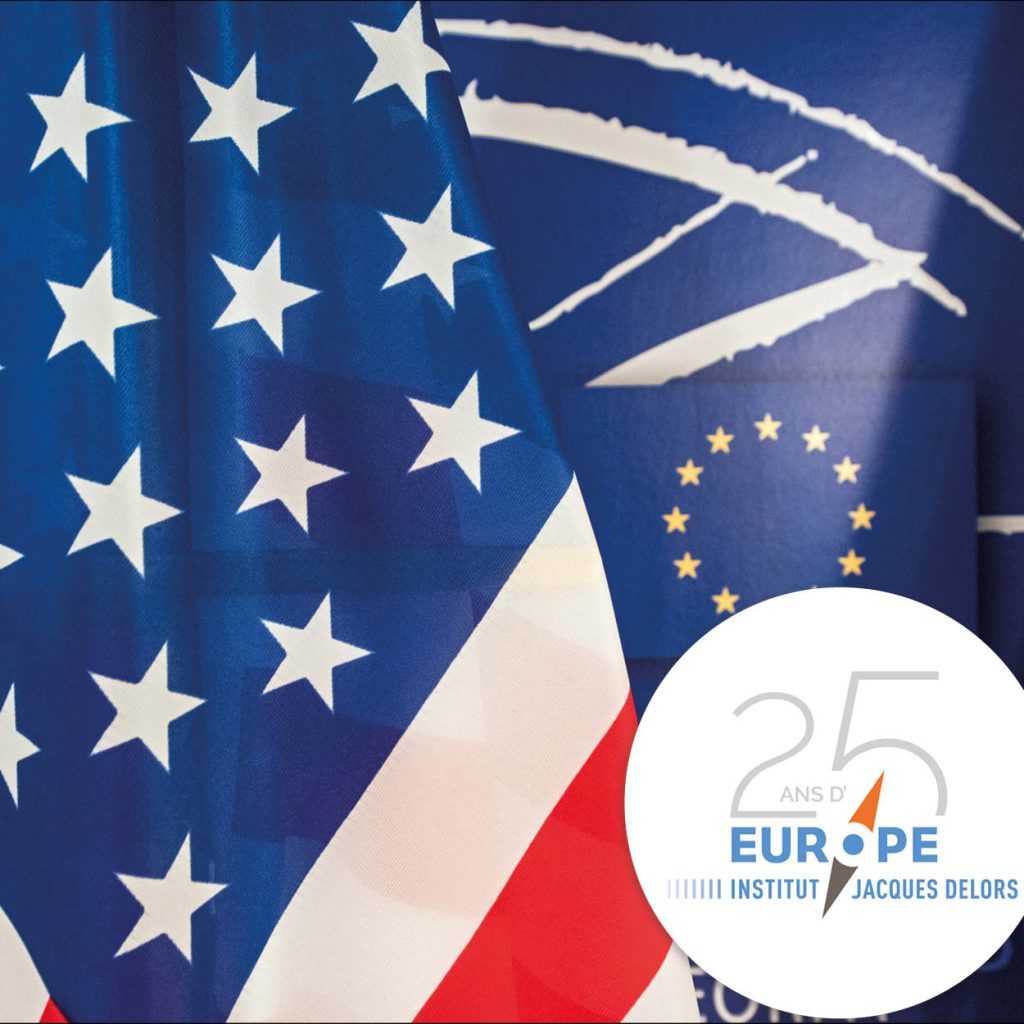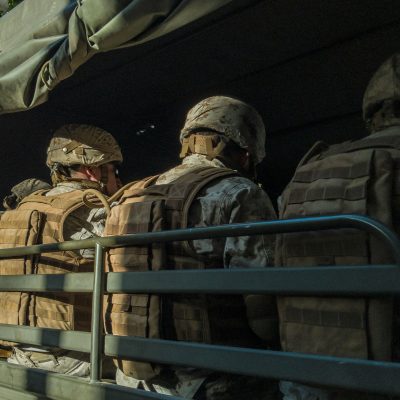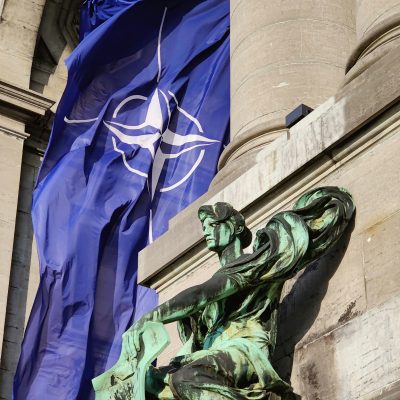The EU and the USA: a new reality with no illusion
By Nicole Gnesotto, Vice-President, the Jacques Delors Institute, Professor at CNAM, holder of the Europe Chair.

The Jacques Delors Institute, in partnership with the Fondation Gulbenkian, held a conference in Paris on 8 December 2020 with a view to exploring what the European strategy could look like for the renewal of transatlantic relations. US partners were not invited to the conference as the idea was to take some time for discussions between us Europeans before fostering dialogue with the USA. This format was intended to illustrate, on the small scale of a symposium, what is covered by the theme of European sovereignty or autonomy.
This paper draws from the debates during the conference in detail, but is not a comprehensive account. It remains a personal consideration of the future relations between the EU and the USA.
▪ ▪ ▪
2021 began with two pieces of good news: the imminent arrival of a Covid vaccine and Joe Biden’s election. Our health security and relations with our American ally are therefore looking more promising. As regards the USA, there is an almost total European consensus on the need to rejuvenate EU-US relations and to seek as many forms of cooperation as possible. The USA, with Anthony Blinken as Secretary of State, is on the same page. However, good intentions will not be enough: weaknesses on both sides and the challenges of Covid will further complicate a renewal of an ambitious, proactive and influential transatlantic relationship, thereby casting doubt on its efficacy.
1. Americans and Europeans each have their illusions regarding new EU-US relations. Europeans hope to be able to revive the good old days of transatlantic harmony, while Americans believe that Joe Biden’s America will put the country back on track for Western leadership. In truth, neither of these will actually occur.
- Several reasons must temper our European optimism regarding a return to a serene and solid transatlantic relationship. The first reason already made Obama somewhat powerless: impossibilities start to stack up between campaign promises and the reality of power once in office. We remember that Obama was never able to close Guantanamo, despite his drive to do so. As regards Russia, he wanted a “reset”, to start again on new foundations. Instead, he ended up bogged down in a conflictual Russia-US relationship, just as Putin wanted. Above all, concerning the Arab and Muslim worlds, he proposed a “new beginning” in his major speech in Cairo on 4 June 2009 and this failed to materialise. Obama was forced to maintain military operations that he wanted to end, particularly in Afghanistan and Iraq.
The second argument calling for caution is that Donald Trump was not always completely wrong in his analysis. The new Democrat administration will continue along the same lines on the following three points: 1) globalisation is no longer good news, it is less beneficial to the USA than it is to its great recipient, China. 2) The conflictual bipolarity between China and the USA will become the new world structure and the greatest number of partners must be brought on board in this struggle. 3) The refocusing on the unity, solidity and prosperity of the USA as a nation is an absolute priority.
Thirdly and finally, the priority of Europe and NATO in US diplomacy was already officially laid to rest by Obama himself in 2011, to be benefit of Asia. This will not be brought back to life under Biden. Since then, the USA has redefined to a great extent its strategic priorities: less Europe and more Asia, fewer military interventions, more trade sanctions, maximum priority to research on new information technologies in both military and civilian areas. Naturally, Joe Biden will restore serenity and diplomacy within the Alliance. However, Ukraine, Belarus, Nagorno-Karabakh or even Libya or Syria will not bring about revolutions in US policy: the USA may no longer be unilateralist, but they will not play the role of policing the world any more. Europe is far from being on top of the US priority list, and rightly so.
- Conversely, there are many examples attesting to the fragile state of US power and leadership. In domestic terms, the country is more divided than ever and Biden will have to reckon with more than 70 million Americans who voted for Trump. Introversion will therefore become necessary for the new president, at least at the start of his term of office, as he is constantly saying: the USA’s international strength is based on its domestic strength. The priority will therefore be the health crisis, (370,000 deaths in January 21), and the social crisis (more than 800,000 unemployed registered per week in October).
Subsequently, in the international arena, Joe Biden will immediately have to deal with China, a country which has become much more powerful, determined and proactive. Despite presidential addresses stating that America must lead again, fortune’s wheel is not turning towards America’s power. China appears to be the major winner of the heath crisis. It was the only country to record positive growth in 2020, once again driving global growth. It has just signed an agreement with ASEAN countries which is absolutely tremendous in terms of scope and participation. In this enormous free trade area, there are four of the USA’s main strategic allies, namely Japan, South Korea, Australia and New Zealand. A world first: four allies who have decided, seemingly without negotiation, that their security alliance with Washington should not impede their prosperity, and therefore have signed a trade agreement with China, an opponent of the USA. If the Democracy Summit is held in Washington in 2021, it is likely that discussions will focus on the very concept of the Alliance. American leadership will struggle to rebuild itself.
Within NATO, Joe Biden runs the risk of finding himself in an uncomfortable position, trapped between his Atlantic pragmatism and his democratic fervour. In NATO, he will have to contend with some allies who are increasingly becoming less democratic: Turkey, a country that has become authoritarian, with an interventionist policy in Syria and Libya, sometimes an ally of Moscow concerning the sale of arms, in short, an uncontrollable and questionable country which remains an important member of NATO and which defends its southern flank. Other forms of authoritarian dissent can be seen in Poland and Hungary, and to a lesser extent in other Central European countries which have developed the concept of “illiberal democracy”, running counter to the foundations of the rule of law but remaining the most concerned about the Russian threat to their borders. Is it possible to be the leader of an alliance of democracies and to defend NATO’s excellence when such important members are betraying their founding values on a daily basis?
Conclusion 1: Trump’s legacy will continue to inform Joe Biden’s foreign policy. Biden will be more the president for intra-American reconciliation rather than Euro-American reconciliation, and the USA’s leadership capacity over the Alliance and the West is proving to be more than problematic.
2. Going beyond very real political issues (climate, Iran, China, etc.), the fundamentals of transatlantic relations must be considered with a view to rebuilding a long-lasting relationship. Yet they have undergone far-reaching changes: it is no longer external threats that unite us, but rather the crisis within the West.
- What brings us together:
The crisis affecting western power. Although the USA remains the leading global power, we are no longer in an age of western power having the monopoly. We no longer live in this world and yet it has been completely regulated, dominated and ruled by the US since 1945. Europeans and Americans are not certain about the relativity of Western power but it is a reality (particularly in terms of demography). Above all, it is considered to be relative by the rest of the world. China has made it one of its priority areas post-Covid.
The fragile state of our economies and democratic systems with and after Covid. The pandemic is continuing to threaten growth, cohesion and the effectiveness of political systems in Europe and in the USA alike.
Our inability to prevent and control future challenges: climate, AI, digital technology, health.
- What sets us apart:
Vision: the USA looks at the world in terms of confrontation while Europeans consider it more in terms of a global partnership. The analysis of the international system is at the core of this difference: on one side, a somewhat simple bipolar vision of the future (the West and the rest), and on the other a more complex vision in which multilateralism is changing into a certain division of power. This difference is a potential source of major discrepancies: regarding China, the very concept of a Western Alliance and the reform of multilateral institutions.
Ambition: the USA, and Joe Biden himself, believe it necessary and possible to restore American leadership. Europeans are now thinking more in terms of autonomy. These two goals are incompatible and intrinsically conflictual. The Atlantic Alliance will bear witness to this “philosophical” discordance.
Conclusion 2: a new alliance is only meaningful if it reflects this new order. Just as post-Covid Europe would be wrong to stick to a strategy of renewed austerity and previous rules to stimulate growth, similarly, to renew the EU-US alliance, a strategy which involves restoring the old Atlantic framework would be anachronistic and ineffective.
3. To define a new strategy, Europeans should first of all clarify a number of key questions with a view to shaping future EU-US relations
- As regards Western strategy in globalisation: is the aim to maintain superiority and the positions obtained in the last seventy years at any cost, even if it comes to war? Or is the idea damage limitation and to co-manage the international system with new players before it is too late?
- As regards Europe’s position in the West: its own identity or an amalgamation into the American mainstream? In other words, does the emergence of a single threat (China) or conversely future strategy uncertainty force the West to unite or does it call for multiple and compatible American and European identities?
- As regards globalisation itself. The globalised pandemic has already changed the world: the EU must exist in a “world which is more Chinese, more State-run, more digital and more cautious”. It will also change Europe: “European sovereignty means that the EU requires greater justice in world trade, enhanced protection of citizens’ fundamental rights and more defence of Europe’s areas of excellence and specialisation”. In this debate, where does the WTO stand? Is reform necessary or is the WTO already obsolete? What can be said of transatlantic free trade as the resumption of negotiations on a new TTIP (TAFTA) can be ruled out under all circumstances[1]?
- As regards global security: does this require a global alliance? In other words, do we need an Alliance with decision-making capacity on all things (Chinese investment, health crises, strategic threats, governance of digital technology and new technologies, etc.) or is it better to preserve Atlantic and European decision-making bodies which work together but are separate?
- As regards multilateralism: is it compatible with leadership by a single nation?
Conclusion 3: these debates will most likely not take place due to a lack of time or body to organise them. Could the High Representative launch seminars to consider these questions, with in particular the various prospective policy offices within the European institutions and Member States?
4. Scenarios for the future of transatlantic relations and of NATO
In real terms, the aforementioned divergent views, although tacit, outline two possible scenarios for the development of EU-US relations:
- A global, comprehensive and general NATO. [2]
The organisation would extend its relevance over all global theatres (including China), all issues that could affect the security of its allies, and would be open to all the world’s democratic countries, whether these countries are actually founded in the rule of law or only rooted in the Western camp. Such a development is justified if we consider that the political structure of globalisation can only be one of conflictual bipolarity between the West and China.
It is frightening though, as it destroys the EU’s political specificity: if every issue is discussed and decided in the Alliance, including trade rules with China, potential technological partnerships, the receipt of FDI in key strategic sectors on each side, precautionary health and climate policies, the necessary logistical management in a time of crisis, etc… it is difficult to see what would be left for European autonomy to act on. The EU would be reduced to what is already appears to be for some: a mere consumer association.
- A twofold structure for discussion, made up of NATO for defence issues and of an EU-US bilateral partnership for other challenges.
This scenario would have the advantage of maintaining NATO’s strategic role and primacy in defence matters, while taking into account the need for global dialogue on security in another specific kind of political forum which would reflect the different identities of the USA and of the European Union.
This twofold structure was in partial operation thirty years ago. The 1990 Transatlantic Declaration enacted direct bilateral dialogue between the USA and the EEC. As part of this understanding, on 3 December 1995, the EU and Bill Clinton signed the New Transatlantic Agenda (NTA) in Madrid, covering in particular peace and stability, democracy and global development, global challenges (even then) and world trade. This bilateral structure fell into disuse from the Obama administration in 2010, as Americans did not see the point and Europeans did not propose anything much of substance.
The globalisation of security issues, together with the EU’s rise over the last 20 years, has made this structure relevant again. The new transatlantic dialogue would link two forums: NATO for military and strategic challenges, and bilateral EU-US dialogue to discuss all other security issues. Together, this would shape a kind of new bilateral Atlantic community, with a military arm (NATO) and a global security arm (EU-US bilateral discussion forum) [3]
Conclusion 4: simplicity is not necessarily a virtue. Channelling everything through NATO entails a risk that nothing more would be done in the EU. Yet the risk for US autonomy must also be stressed: a global NATO would imply that US foreign policy would also be discussed in this forum, and not simply European challenges. Would the USA agree to this?
5. Out of a few concrete proposals: a proactive stance from Europeans, but on which issues?
- Foreign policy is not a field in which it will be easy for Europeans to be proactive. We do in fact have contrasting opinions on almost all subjects. We are divided regarding Russia, and therefore on the management of all crises in the post-Soviet world: Ukraine, Georgia, Armenia, etc. We are as bogged down on the issue of Turkey as the USA. We are divided or indifferent regarding the crises in the Middle East. Neither is the Chinese “threat” perceived in the same manner by the EU-27. As regards Africa, this may well be the issue with the least amount of divergence, yet it is also the issue that mobilises the USA the least.
That leaves Iran. This is certainly an issue for which we will have to come up with an urgent roadmap, before the Iranian regime descends into unacceptable provocations. Not letting the worst come to pass, immediately reconvening the P5+1 forum on the JCPoA agreement, that should be the urgent diplomatic course of action on Iran.
- As regards European defence, there are well-known divergences within the EU and Joe Biden’s election will not contribute to either an appeasement or a clearer affirmation of the EU’s strategic autonomy. This issue should not become a priority, however: as we deal with Covid, and for as long as the ensuing economic crisis shall last, initiatives in this direction will not be a priority for any country. The situation is unfavourable: the European Defence Fund has been cut by half, the arms industries are a real issue that is more technical than political, and the very idea of external interventions has required a serious critical examination since 1990.
- Considering the values upon which external actions are supposed to be based, and that Joe Biden seems to want to place at the centre of his diplomacy, we should be more modest and less on the offensive regarding this issue. Europeans and Americans are the staunchest allies of the Saudis and of all Arab authoritarian regimes. We applauded the military coup of General Sisi in Egypt, not to mention our strategic dealings with Pakistan and our blindness to most of our African partners. Highlighting common democratic values to re-bolster EU-US ties therefore remains a dangerous exercise in terms of image and credibility. The Democracy Summit in Washington is a risky endeavour for the USA.
Conversely, consolidating our own democracies, particularly after the devastating image of the invasion of the US Capitol Building by Trump supporters, must be a priority. Even if our global partnerships are not always exemplary regarding human rights, we must defend our systems of society and political representation: gradually fighting propaganda from China and other nations insinuating that democracy does not enjoy a universal scope or superiority over other political organisations, even that authoritarian regimes are more effective and competent, must be one of our absolute priorities.
*We must rather emphasise our common interests. They are, however, easier to define for non-military crises: climate, health security, information security. The governance of such issues is either nascent or inexistent and yet it is essential for the future. The reform of the WTO, the invention of cyber-governance, not to mention our common interests on the boundaries of biotechnology for example, should be the subject of regular reviews. These are the areas in which Europeans enjoy what it takes to make useful proposals. Similarly, the forward-looking analysis of new security challenges and risks to democracy that arise from new technologies and digital innovations is a major topic of common interest.
<hr>
[1] Ideas taken directly from the debate between Pascal Lamy and Xavier Timbeau during the round table on trade and the future of globalisation.
[2]. This vision is very present in the report on NATO’s future published on 3 December 2020.
[3] While it may appear a good idea on the surface, resurrecting the European pillar within a global NATO would be a mistake. The EU cannot be reduced to a sub-group of the Alliance, the operating rules and decision-making capacity of which would continue to apply.




